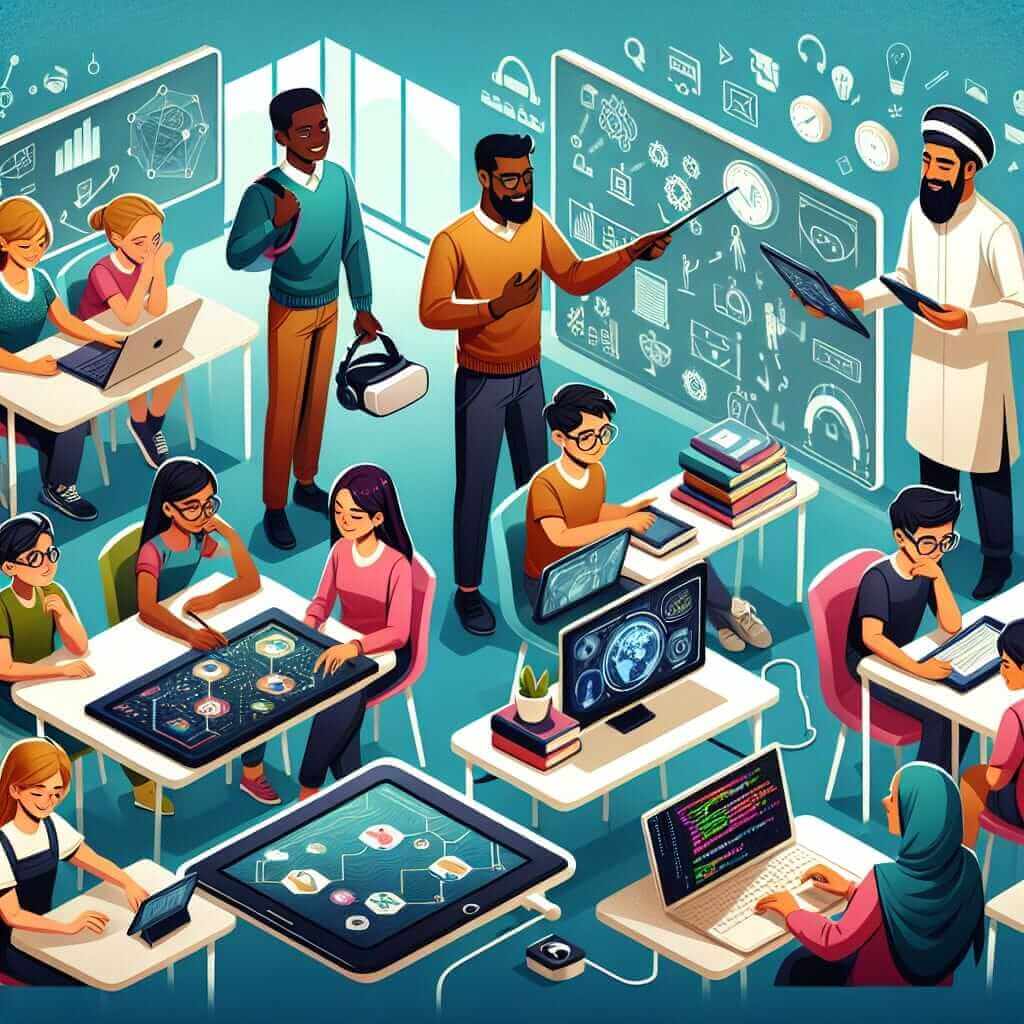In recent years, the role of technology in enhancing and democratizing educational access has been a frequent topic in IELTS Writing Task 2. Previous exam papers reflect a growing interest in this theme, mirroring its significance in contemporary society. Given the increasing integration of digital tools in education, it’s likely that related questions will remain prevalent in future IELTS exams. Below are two closely related past IELTS essay topics to this subject:
- “Technological developments in education have had a significant impact on access to education.”
- “How has technology improved educational opportunities in both developed and developing countries?”
These prompts highlight different facets of the central theme. For our detailed analysis and sample essay, we will focus on a topic that synthesizes these elements.
Selected Topic for Sample Essay
Some people believe that the integration of technology in education has drastically improved educational opportunities, while others argue that it has introduced new inequalities. Discuss both views and give your opinion.
Analyzing the Essay Prompt
For this essay, you’ll be expected to:
- Discuss both views: Acknowledge and explore both the positive and negative impacts of technology on educational opportunities.
- Give your opinion: Clearly state your own position on the matter.
Sample Essay
The integration of technology into education has been a contentious issue, eliciting diverse viewpoints. While some argue that technology has significantly enhanced educational access and quality, others contend it has exacerbated existing inequalities. This essay will examine both perspectives before presenting my own viewpoint.


On one hand, technology has undeniably revolutionised education by making it more accessible. The advent of online learning platforms, such as MOOCs (Massive Open Online Courses), has democratized education, providing opportunities for learners irrespective of their geographical location. For instance, platforms like Coursera and edX offer courses from prestigious universities to anyone with an internet connection. This has particularly benefitted individuals in remote or underprivileged areas who otherwise wouldn’t have access to quality education.
Moreover, technology has enabled personalized learning, catering to the needs of individual students. Adaptive learning software can assess a student’s strengths and weaknesses, providing customized content to enhance their learning experience. Additionally, interactive tools and multimedia resources have made learning more engaging, fostering better retention and understanding of complex concepts.
On the other hand, critics argue that the digital divide has created new layers of inequality. Not everyone has equal access to the necessary technology or internet connectivity, particularly in developing countries. This digital disparity means that while some can reap the benefits of technological advancements, others are left behind. Moreover, the cost of advanced technological devices and software can be prohibitive for lower-income families, further entrenching educational inequality.
Furthermore, there are concerns about the over-reliance on technology potentially diminishing traditional educational values. The human element, considered crucial in the teaching and learning process, may be undermined. The lack of face-to-face interaction can affect the development of essential soft skills such as communication, teamwork, and critical thinking.
In my opinion, while technology has undoubtedly opened up new educational opportunities, it is crucial to address the digital divide to ensure equitable access. Policymakers should implement strategies to provide affordable internet access and technological resources to underprivileged communities. Simultaneously, a balanced approach that integrates both traditional and technological methods of teaching can ensure a holistic educational experience.
In conclusion, technology’s role in education presents both opportunities and challenges. While it has significantly broadened educational access, efforts must be made to address the inequalities it may introduce. By doing so, society can harness the full potential of technology to provide inclusive and high-quality education for all.
- (391 words)
Writing Tips for This Topic
- Vocabulary: Use varied and advanced vocabulary to express your ideas clearly. For instance, words like “democratized,” “digital divide,” and “holistic” add depth to your writing.
- Grammar: Ensure your sentences are grammatically correct. Use complex sentences to enhance cohesion and coherence, but avoid overly complicated structures that might be confusing.
- Balanced View: Make sure to present a balanced view by discussing both the positive and negative aspects before stating your opinion.
- Examples and Evidence: Support your arguments with relevant examples and evidence. This lends credibility to your essay and demonstrates your ability to think critically.
Key Vocabulary to Remember
- Democratized (verb) /dɪˈmɒk.rə.taɪzd/: Made accessible to everyone.
- MOOCs (noun): Massive Open Online Courses.
- Adaptive Learning (noun): A technology-based system that adapts to the learner’s needs.
- Digital Divide (noun): The gap between those who have ready access to computers and the internet, and those who do not.
- Holistic (adjective) /həˈlɪs.tɪk/: Considering the whole rather than just parts.
- Revolutionised (verb) /ˌrev.əˈluː.ʃən.aɪzd/: Drastically changed or transformed.
- Over-reliance (noun): Depending heavily on something.
Conclusion
The influence of technology on educational access is a multifaceted issue likely to remain relevant in IELTS exams. As technology continues to evolve, its role in education will undoubtedly provoke further debate. Thus, understanding both the positive and negative implications is crucial in crafting a balanced and insightful essay. Potential future essay topics may explore specific aspects like the role of artificial intelligence in education or the impact of social media on learning.
For additional resources, consider reading related articles about The Influence of Mobile Technology on Learning or Educational Access and Digital Transformation.